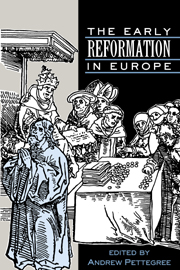7 - The Netherlands
Published online by Cambridge University Press: 06 January 2010
Summary
On 29 March 1521 Cornelius Grapheus, the town secretary of Antwerp, finished his introduction to a previously unpublished treatise on Christian liberty by a fifteenth-century critic of monastic vows. Grapheus' words eloquently demonstrated the depth of his commitment to Christian humanism. Christianity, he asserted, had relapsed for the past eighthundred years into ‘a more than Egyptian servitude’, where man-made ordinances had replaced ‘Christ's yoke’, and ‘human fables’ his promises of redemption. He deplored the closed-shop mentality of the theologians who denied the laity access to the Scriptures on the spurious grounds that they had no knowledge of the schoolmen and complicated the Gospel with subtleties of their own invention. In language reminiscent of Erasmus, he called for the translation of the Scriptures into the vernacular and for expository preaching so that ‘the philosophy of Christ’, which was common to all, might be available to all. Grapheus was full of optimism about the present age. Those devoted to Christian liberty could take heart for ‘everywhere good letters arise again, the Gospel of Christ has been reborn and Paul has come to life once more’.
Grapheus was emboldened to assail the monkish establishment and scholastic theology because for some years both had been on the defensive. By 1520, Christian humanism had influential advocates in the grammar schools, among the jurists and, in the case of Groningen, among the leading clergy. In the grammar schools the textbooks of Vives and Despauterius were displacing Alexander's Doctrinale on the syllabus and Greek made an occasional appearance on the curriculum. The growing popularity of Erasmus' Enchiridion provided yet another indicator of the way opinion among the intellectual elite had changed.
- Type
- Chapter
- Information
- The Early Reformation in Europe , pp. 142 - 165Publisher: Cambridge University PressPrint publication year: 1992
- 2
- Cited by



